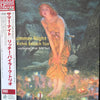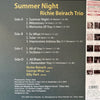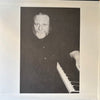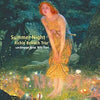







Richie Beirach Trio - Summer Night (2LP, Edition Japonaise)
ORDER LIMITED TO ONE ITEM PER CUSTOMER
Piano - Richie Beirach
Bass - George Mraz
Drums - Billy Hart
2 LP, standard sleeve
Limited edition
Original Master tape : YES
Heavy Press : 180g
Record color : black
Speed : 33RPM
Size : 12”
Venus Hyper Magnum Sound Direct Mix Stereo
Studio
Record Press : Japanese Pressing
Label : Venus
Original Label : Venus
Recorded at The Studio in New York on September 4 & 5, 2007
Engineered by Katherine Miller
Mixed and mastered by Shuji Kitamura, Tetsuo Hara
Produced by Tetsuo Hara, Todd Barkan
Photography by Mary Jane
Design by Taz
Originally released in July 2008
Reissued in 2024
Tracks :
Side A
1. Summer Night
2. Milestones
3. Memories Of You
Side B
1. So What
2. Solar
3. Impressions Intimas No.1
Side C
1. All of You
2. Siciliano
Side D
1. All Blues
2. I Remember You
Reviews:
"Richard Alan Beirach was born on 23 May 1947 in Brooklyn, New York City. Having a sheltered childhood, he started playing the piano at the age of 5. From age 6 to age 18, Beirach was given lessons by the pianist und composer James Palmieri. "James Palmieri showed me everything that I know about music,...he made me understand the deeper meaning of music."
Palmieri's lessons were strictly classic and until age 13, Beirach exclusively dealt with classical music.When, at the age of 13, he stayed at a friend's place, he heard Red Garland's version of "Billy Boy" from Miles Davis' album "Milestones": "I could hardly believe it. This was exactly what I was looking for, what I needed. Until then, I had only had a classical musical education: Mozart, Beethoven, no improvisation. I took the album to my teacher. He hated it, he hated it a lot…"Beirach realized that he wanted to devote himself to improvisation and Jazz. He tried and got in touch with Jazz musicians, while continuing to take lessons with Palmieri.
In the middle of the 1960s, Richard Beirach entered the New York club scene, played innumerable gigs and jam sessions, with, among others, Freddie Hubbard and Lee Konitz, while, at the same time occasionally working as a longshoreman at the docks of New York.In 1967, he went to Boston in order to study at the Berklee College Of Music, where Keith Jarrett, Miroslav Vitous and John Abercrombie were enrolled as well at that time. But he only stayed for one year and returned to New York in 1968, where he started a composition degree with Ludmilla Ulehla at the Manhattan School Of Music, from which he graduated in 1972 with a "Master Of Music".
Soon afterwards, he played in the band of Stan Getz, together with bass player Dave Holland and drummer Jack deJohnette. The band largely went on worldwide tours.In 1973, he joined the group "Lookout Farm" of the saxophone player Dave Liebman. "Lookout Farm" became one of the most outstanding groups of the Fusion movement and the cooperation between Beirach and Liebman beyond the group, which broke up in 1976, developed to a close musical partnership. Together, as a duo, they recorded "Forgotten Fantasies", "Omerta" and "Chant"". In 1976, the first album under Beirach's own name was released: "Eon", recorded with drummer Eliot Zigmund and bass player Frank Tusa. For the label ECM, Beirach worked as a leader, e.g. on the albums "Eon" in 1976, "Elm" in 1979, "Elegy for Bill Evans", and as a sideman respectively (for John Abercrombie and George Adams) from the middle of the 1970s until the beginning of the 1980s." All Abou tJazz.
Ratings :
Discogs : 4.2 / 5



